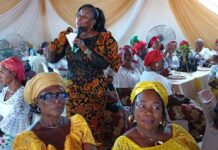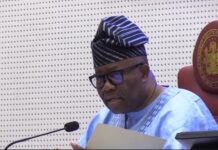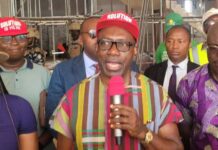The plight of Nigerian traders in Ghana is once again in the spotlight, as new reports highlight how business regulations and local enforcement tactics may be fuelling xenophobic tensions between the two West African countries.
According to The PUNCH, Nigerian business owners in Ghana have raised alarm over increasing hostility, citing Ghanaian laws, enforcement agencies, and landlord decisions as factors making life unbearable for them. The traders claim that these policies are being selectively enforced and have become tools of intimidation and exclusion.
At the heart of the issue is Ghana’s Ghana Investment Promotion Centre (GIPC) Act, which requires foreign traders to have a minimum capital base of $1 million before engaging in retail trade. Nigerian traders say this law, though longstanding, has been increasingly used as a pretext to shut down shops, seize goods, and intimidate business owners, especially in Accra and Kumasi.
A Nigerian trader who spoke anonymously told PUNCH that landlords now refuse to rent shops to Nigerians, citing local pressure and the risk of shops being sealed by authorities. “Our shops are being closed arbitrarily and our goods confiscated,” he said. “We are being forced out of the system.”
Mr. Chukwuemeka Nnaji, President of the Nigerian Union of Traders Association in Ghana (NUTAG), explained that some landlords received verbal warnings from Ghanaian municipal officials not to rent spaces to Nigerian nationals, or risk fines or shop closures. This has resulted in many Nigerian traders losing their business premises overnight without any formal legal backing.
“The law is being applied with bias,” Nnaji told PUNCH. “We are ECOWAS citizens and have the right to trade in any West African country without discrimination.”
These developments have triggered fears of xenophobia, especially after multiple Nigerian businesses were shut down or harassed during previous trade disputes in 2018 and 2020. At the time, hundreds of Nigerian-owned shops were closed, prompting diplomatic intervention from Nigeria’s government.
The situation now appears to be worsening again.
Ghanaian authorities, however, maintain that the enforcement of the GIPC Act is a matter of sovereign economic policy, aimed at protecting local businesses and regulating foreign participation in retail markets.
But critics argue that the timing and selectivity of enforcement suggests otherwise.
“The law has always been there,” another trader said. “But why is it now being aggressively enforced against only Nigerian businesses?”
The traders are now calling on ECOWAS and the Nigerian government to intervene. “If ECOWAS freedom of movement and trade cannot protect us, then what is the point of the protocol?” asked a trader in Accra.
PUNCH reports that Nigerian authorities have acknowledged the traders’ concerns and are considering diplomatic options to resolve the matter.
The Nigerian High Commission in Ghana has reportedly been notified and is expected to release a statement or take action in the coming days.
How Self Proclaimed Igbo King Sparked Protest
ANN confirmed that the protest may have been triggered by the public declaration of a Nigerian national, Chukwudi Ihenetu, as the “Eze Ndi Igbo” (king of Igbos) in Ghana.
ANN that gathered that though Ihenetu made the declaration during an interview in 2013, the video of the interview, however, resurfaced a few weeks ago, sparking outrage from many Ghanaians.
In the four-minute-long video reported by PUNCH in Ghana, revealed that he had acquired 50 acres of land in Ghana to build an Igbo Village, which, according to him, would consist of a market, a guest house, Eze Ndigbo palace, a 2,000-capacity town hall and streets named after Igbo leaders.
“I’m creating an Igbo village which has never happened in the history of Igbos in the world. As I’m talking to you, I have acquired 50 acres of land, which is 250 plots of land along the Aflao road in the Old Ningo area. The reason for acquiring this land is to build an Igbo village in Ghana, which I call Ama Ndigbo in Ghana.
“We will build the village, and in this village, we are going to build the palace of Eze Igbo, a huge palace. We will build an Igbo town hall with about 2,000 and a 100-room guest house. The essence of this guest house is to accommodate our governors and other Igbo great leaders when they come to Ghana with their entourage. We will also accommodate some of our people who have accommodation,” Ihenetu said.
He added, “In the village, we will create streets that will represent the names of ancient Igbos, like Sam Mbakwe, Nnamdi Azikiwe, my father and other great leaders of Igbo that have gone and those that are present.
“In this village, every Igbo man all over the world will come and buy property, whether you want a plot or two plots of land to build your dream house. We will build Igbo market, school and Eze Igbo garden, and from there Igbo people will expand.”
Following the outrage generated by his declaration, Ihenetu was invited by Ghana’s Foreign Affairs Minister, Sam Okudzeto Ablakwa.
According to Ablakwa, Ihenetu apologised to the government and people of Ghana, assuring that he has long abandoned that idea and has not purchased any piece of land for that purpose.
“As I emphasised in the meeting, Ghana is exceptionally proud of its celebrated friendly foreign policy, which is welcoming of all to our beautiful and peaceful country, particularly Africans and people of African descent. We are determined to keep championing that Pan-African identity, for which we have attained global renown,” Ablakwa was quoted as saying.
In his apology video, Ihenetu said, “We have no single land that we want to develop as an Igbo village in Ghana, as far as I’m concerned now. And honestly, the vision of that particular land did not hold, and I abandoned it long ago.”
No Cause For Alarm – President Mahama
However, in a statement on Friday, President John Mahama of Ghana assured Nigeria of the safety of its nationals residing in Ghana, stating that there is no place for xenophobia in the country.
Mahama also reaffirmed Ghana’s commitment to the Economic Community of West African States protocols, especially those concerning the free movement of persons and goods within the region.
A statement on Friday by the Special Assistant on Communication and New Media to the Minister of State for Foreign Affairs, Magnus Eze, said the Ghanaian President gave the assurance on Thursday while receiving President Bola Tinubu’s special envoy, led by Minister of State for Foreign Affairs, Ambassador Bianca Odumegwu-Ojukwu, at the Presidential Palace in Accra.
“Tell President Tinubu not to lose sleep over the recent protests. Nigeria and Ghana are brothers with a shared history, and we won’t allow anything to come between us,” the statement titled, “Mahama to Tinubu: No room for xenophobia in Ghana,” quoted Mahama as saying.
ANN Analysis
This latest episode underscores the fragile balance between economic nationalism and regional integration, especially under ECOWAS. Ghana’s attempt to shield local traders from foreign competition—particularly Nigerian traders who dominate West African retail sectors—is clashing with the ECOWAS trade and movement protocol that both countries are signatory to.
As the tension brews, the fear remains that such policies, while legal in theory, may trigger deeper social divisions if left unchecked.





